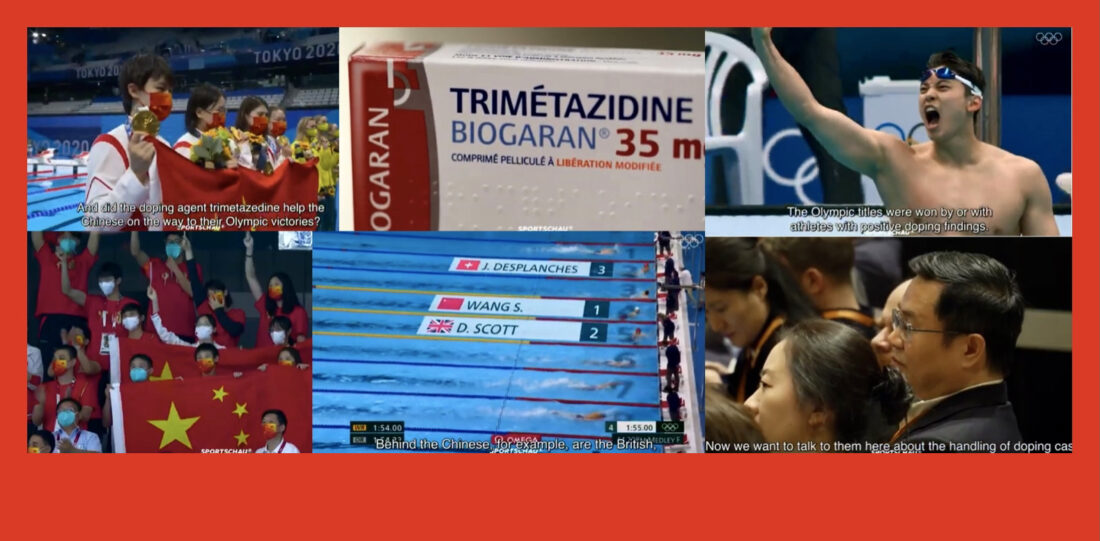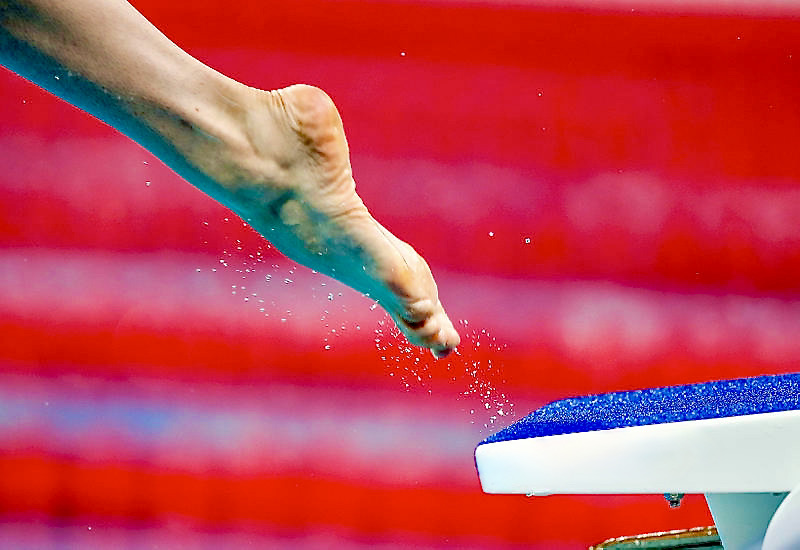Ex-WADA Boss Howman Says Global Regulator Would Have Been Wiser To Challenge China At CAS On Go-Free 23

The World Anti-Doping Agency (WADA) would have been wiser to have challenged China’s decision to clear 23 swimmers who tested positive for a banned substance and keep the cases secret ahead of the Tokyo Olympics in 2021, according to David Howman, former head of the global regulator.

Wada Director General from 2003 until the Rio Olympic Games in 2016, Howman told this reporter for The Times (in the newspaper today) and State of Swimming that Wada’s decision to accept China’s version of events on trust “was a mistake” that could deal a serious blow to the integrity of the anti-doping system.
The investigative powers of the regulator might also undermine the trust needed for whistleblowers to report wrongdoing, he suggested.

Chair of the Athletics Integrity Board, Howman is conscious of the impact of his words as former head of Wada but decided to break his silence after watching the regulator’s management defend its decision to keep the Chinese cases a secret on grounds that the swimmers had “innocently” tested positive for the heart-booster trimetazidine (TMZ) during a competition in the first week of January 2021.
Wada acknowledged that it had no direct access to China at the time because of Covid travel restrictions.
As such, it had no way of verifying the version of events coming out of China.
In a report that has not yet been published, national anti-doping agency Chinada told Wada and World Aquatics that Ministry of Public Security agents had allegedly discovered traces of the banned substance in the kitchen of a hotel 10 weeks after they had stayed there. That investigation is said to have taken place just before Chinada entered 28 positives from the 23 swimmers, in Wada’s Anti-Doping Administration & Management System (ADAMS) in mid-March.
It was mid-June, a month out from the Tokyo Olympics, before Chinada reported on its reasons for declaring the event one of “mass contamination” and “no fault” for the athletes who tested positive for a substance that led to suspensions for controversial Chinese swimmer Sun Yang* and Russian teenage figure skater Kamila Valieva*, among many others.
Experts note that no documents have been offered to show that athletes were served proper notice of their positives, nor had the provisional suspension process required for drugs such as TMZ occurred. “Why? That would be contrary to WADA rules,” says Howman.
Anti-doping schism has resulted from a lack of transparency, he believes. The United States Anti-Doping Agency (Usada) says the matter had been “swept under the carpet”, while Wada president Witold Banka says that if the same incident and circumstance happened again, the global regulator would do the same thing.
An “independent” investigation is now underway to judge whether his view would be justified.
Howman believes the matter should have been considered beyond Wada’s senior management before decisions were taken. “The issue for me is one of process and engagement of anyone other than management,” he says. “To date we’ve heard a lot from the management team but have had no documentation, no written expert opinions that might have led to such decisions.”
While Howman is certain Olivier Niggli, the man who succeeded him as director general, “would have been careful enough to make sure the president [Witold Banka] knew and agreed, I don’t know any of what the president did or didn’t do, but he certainly didn’t engage the key WADA governance body, the executive committee, and he may well regret that.”
He added: “I’m a lawyer, you’re a journalist and as we know, you don’t just go on what people say. We’re told that they have had reports from independent expert lawyers and independent expert scientists and medical experts and so on. So, show those documents. If they don’t show them, the only conclusion we can reach is that they’re scared to do so.”
“Why is it that so far not one person around the table has seemingly asked the question ‘can you show me the documents?“ asks Howman.
He is also concerned that officials have been playing down the severity of TMZ, which “hasn’t yet been called out in the way it ought to be. TMZ is one of the preferred drugs of choice of dopers who are intentionally doping. Several cases have been reported even recently.”
The “fear factor is running supreme”, said Howman. Wada could turn the tide by either revealing the Chinada report and the details of any other related processes or simply say ‘we got it wrong’ because “they’d be better off saying ‘we’re open to criticism; we’ll listen to anything and we can talk with you about it and we’ll see if we can get to a satisfactory conclusion’.”
“That’s the proper way of dealing with these things,” he emphasised. “Not ‘look out, we’re coming after you’ [if you question what we’ve done]. That fear factor is now pervading the whole of the anti-doping community and if that community is fearful if they speak up, that would be a terrible indictment.”
USADA and Global Athlete have led calls for Wada to submit to review and reform. Now, the Chinese cases have sparked schism in the fight for clean Sport and in response to Wada‘s Foundation Board meeting and comments by founding president Dick Pound, USADA today issued the following statement:
Presentation of Facts Following WADA President’s Reckless and Harmful Statements About U.S. Athletes to the WADA Foundation Board Members
Howman: “… where it starts to lose touch with reality”
As far as Howman is aware, the Chinada report contains nothing that “tells you where this stuff [TMZ] came from”. Chinese authorities have admitted that they have been unable to fund anyone connected to the hotel and its kitchen with a medical condition or prescribed medication that might explain the alleged presence of a heart drug in a spice container.
Believing the story of “TMZ found in drains, extractors, the sink … at a time when cleansing was the Number 1 priority [in a pandemic] is where it starts to lose touch with reality,” said Howman.
A barrister specialising in sport law before his Wada days, Howman empathised with the position of WADA Counsel Ross Wenzel but added “this is not about law. This is about a process to show the world that WADA is doing things in the correct way, both in terms of following their rules and investigation processes, and WADA [being] transparent in what they do.”
Wada is adamant that a challenge at the CAS could not have been won but Howman says:

“Look, this is where the lawyers are losing touch. They say you cannot appeal … because you are not going to succeed. That’s not what you do with the law as a regulator. You test the laws by going to court to say, okay, you guys [the CAS] are paid to make decisions. Here’s a set of facts and expert opinions. We’re concerned about our rules. With this in mind, tell us how they should be construed.
“That’s what you do when a big thing like this rears its head. You should test it and get the answers you need.”
David Howman
The Wada Code and related rules can only be the best they can be if you learn by testing unusual circumstances that are not necessarily covered by prevailing rules, he suggested.
The 23 swimmers should have been provisionally suspended pending full hearings, he believes. That way, both the law and Wada would have been seen to have played their respective roles in doping control and athletes suspended even though ingestion of a banned substance was deemed to have been ‘inadvertent’, might not feel they had been held to a different standard of accountability than the Chinese.
Trust In The System
The handling of the 2021 cases may have undermined the trust whistleblowers place in Wada, Howman believes. One of the core missions of Wada had been to make the whistleblower feel safe to come forward.
Howman believes the investigation being led by former Swiss prosecutor Eric Cottier needs to answer “a lot of key questions”.
On the issue of the new committee established by World Aquatics to audit the federations processes in light of events in 2021, Howman could see why anti-doping experts and investigators left out of the loop might feel frustrated because they “should be providing the intelligence required”.
World Aquatics had already learned that lesson back in its days as Fina in 2016 when almost half of the independent anti-doping experts on the FINA Doping Control Review Board, including chair Prof. Andrew Pipe, resigned because they said their advice on how to deal with the Russian doping crisis was ignored before the Rio Olympics.
Canadian Professor Pipe, who chaired the DCRB, Dr Larry Bowers, of the USA and Usada, and Dr Susan White, of Australia, wrote a scathing resignation letter in which they noted:

“Despite the anti-doping expertise of the individuals who make up the DCRB, Fina chose to ignore our advice. We learned of FINA’s decisions regarding the eligibility of Russian competitors only by observing the Olympic competition. We were disappointed to note that our recommendations were not followed … This decision, combined with the failure of FINA to enact other recommendations that the DCRB has made in the past, is incompatible with our dedication to clean sport and optimal anti-doping practice.”
Extract from the resignation letter from Drs. Pipe, Bowers and White – photo by Patrick B. Kraemer
World Aquatics is now conducting a review, including athletes on a very steep learning curve about what an investigation actually looks like if conducted to the highest standards.
More on the theme of investigations in the SOS China Diaries, coming soon, as a reminder to those who were around to witness the unfolding of a crisis and a guide for those who were not.
NB: State of Swimming coverage is copyrighted and we do not give permission for any other outlet to copy and paste all the quotes from such work as that above, as has occurred in niche media in similar circumstances when this journalist’s work has been exclusive for The Times and SOS.